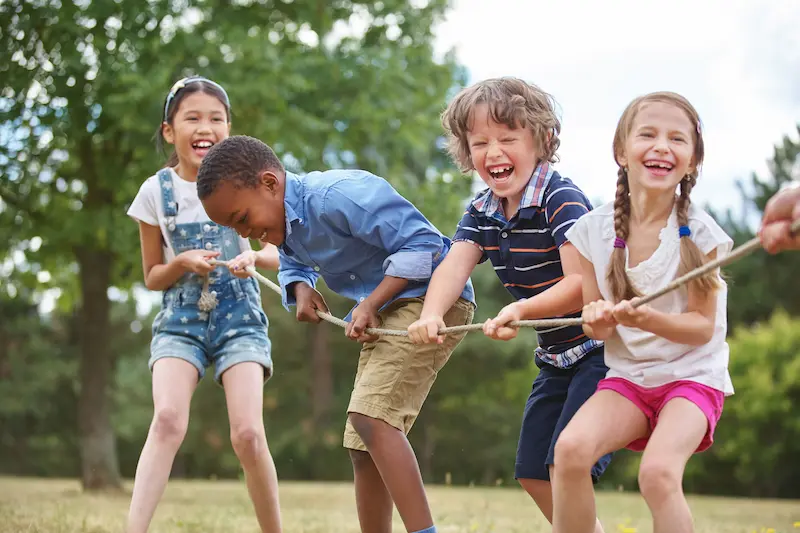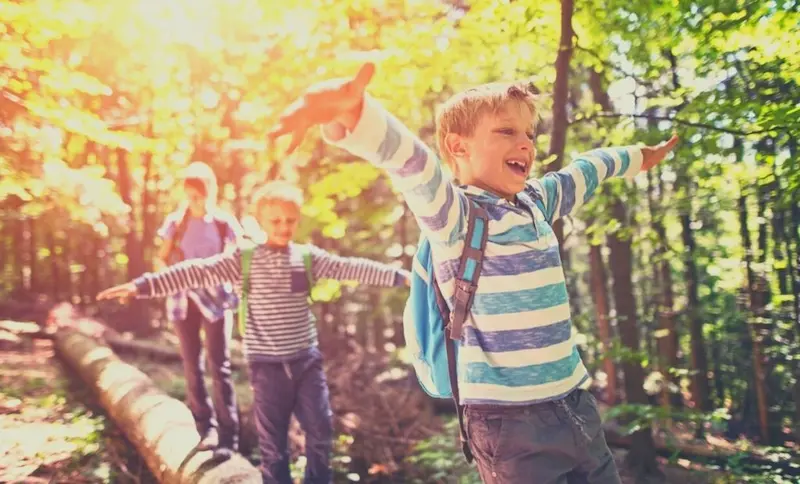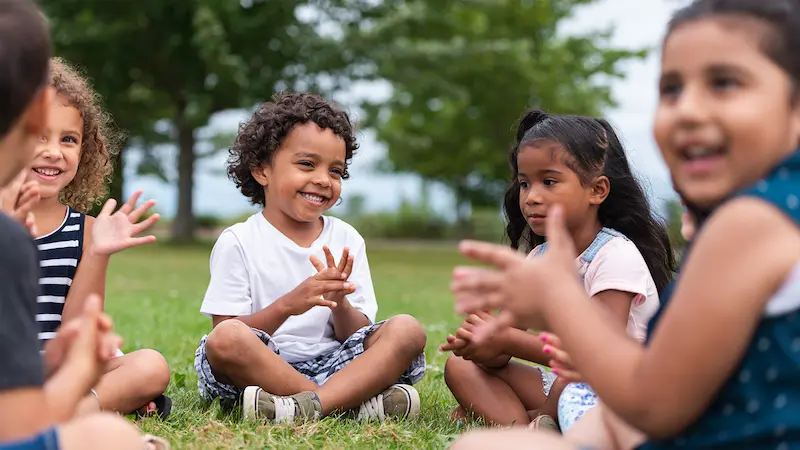Social skills are not only crucial for immediate social interactions but also serve as a foundation for a child’s future successes in academic and professional environments. They empower children to communicate effectively, build strong relationships, and navigate diverse social settings with confidence.
Engaging in daily social skill activities not only improves children’s immediate social interactions but also nurtures their resilience and adaptability in facing various life challenges. These activities contribute to the holistic development of a child, fostering emotional intelligence and a deeper understanding of societal norms and expectations.
Table of contents
- 1. Morning Routines
- 2. Sharing and Cooperation
- 3. Active Listening
- 4. Conflict Resolution
- 5. Empathy Building
- 6. Table Manners and Mealtime Etiquette
- 7. Taking Turns
- 8. Gratitude and Thankfulness
- 9. Teamwork and Group Activities
- 10. Saying Sorry and Forgiveness
- Measuring Progress
- Building a Support System
- Encouraging Positive Peer Relationships
- Cultural Sensitivity
- Conclusion
- Frequently Asked Questions (FAQ’S)
These are the 10 social skill activities for kids:
1. Morning Routines
A. Greeting and Communication Skills
Encouraging children to greet others warmly doesn’t just create a pleasant atmosphere; it teaches them the value of acknowledging and respecting others, laying the groundwork for cultivating empathy and understanding.
By setting positive habits and intentions, children not only focus on their individual growth and self improvement but also contribute positively to the collective environment, promoting a supportive and inclusive atmosphere for everyone.
2. Sharing and Cooperation
A. Sharing Toys and Resources
When children actively participate in sharing activities, they learn the importance of empathy, generosity, and compromise, essential elements that contribute to healthier social dynamics. Also, Through engaging in collaborative activities, kids not only learn to work together but also experience the joy and satisfaction of achieving common goals, fostering a sense of camaraderie and unity among peers.
3. Active Listening
A. Storytime and Listening Exercises
Active listening, when nurtured through activities like storytelling, not only enhances comprehension skills but also encourages children to appreciate different perspectives and narratives. It is the best way to improve social skills for preschoolers.
B. Encouraging Children to Express Themselves
Creating a safe space where children can freely express their thoughts and feelings not only builds their confidence but also strengthens their emotional intelligence, enabling them for effective communication.

4. Conflict Resolution
Teaching Kids to Resolve Disagreements
By guiding children through conflict resolution techniques, we empower them to handle conflicts constructively, fostering a more harmonious and empathetic community.Also, engaging children in role-playing scenarios allows them to empathize with others’ viewpoints and practice problem-solving skills, which are invaluable for resolving conflicts amicably.
5. Empathy Building
Understanding Emotions
Encouraging discussions around emotions helps children develop a deeper understanding of their feelings and those of others, promoting a more empathetic and compassionate approach in their interactions.
Moreover, engaging in activities for kids that promote acts of kindness not only nurtures empathy but also instills the value of contributing positively to the well-being of others, fostering a more compassionate society.
6. Table Manners and Mealtime Etiquette
Teaching Politeness and Respect
Instilling good manners for kids goes beyond the dinner table; it teaches children the significance of respect and consideration for others’ feelings and experiences. Also, Family dining acts as a cornerstone for meaningful conversations, where children learn to actively listen, contribute to discussions, and understand diverse viewpoints, thereby enhancing their conversational skills.
7. Taking Turns
Games and Activities That Promote Sharing
Through turn-taking games, children not only learn patience but also understand the importance of giving others equal opportunities, fostering a sense of equity and fairness.
Encouraging patience and fair play in various activities not only shapes ethical behavior but also prepares children to navigate situations where cooperation and collaboration are necessary.
8. Gratitude and Thankfulness
Encouraging Kids to Express Gratitude
Promoting gratitude encourages children to recognize and appreciate the positive aspects of their lives, fostering a mindset of appreciation and contentment. Regularly engaging in gratitude activities helps children develop a habit of recognizing the good around them, promoting emotional well-being and resilience.

9. Teamwork and Group Activities
A. Cooperative Games and Sports
Engaging in team-based activities not only strengthens teamwork skills but also teaches children the value of collective effort, promoting a sense of belonging and shared achievement.
B. Building Collaborative Projects
Collaborative projects play a pivotal role in nurturing a myriad of skills essential for a child’s holistic development. By engaging in such endeavors, children learn the significance of teamwork, communication, and compromise, fostering an environment where each participant’s strengths are recognized and utilized effectively. This not only cultivates a sense of camaraderie but also instills empathy and understanding as they navigate differing perspectives and ideas.
Moreover, collaborative projects serve as a platform for children to enhance their problem-solving abilities. When confronted with challenges, they learn to brainstorm collectively, pool their diverse insights, and devise innovative solutions. This collaborative problem-solving not only encourages creativity but also teaches them resilience in the face of obstacles.
10. Saying Sorry and Forgiveness
Understanding Mistakes and Apologies
Teaching children to acknowledge their mistakes helps in developing accountability and humility, essential traits that pave the way for healthy and meaningful relationships. Emphasizing the significance of forgiveness not only promotes healing but also empowers children to let go of negativity and cultivate empathy towards others’ feelings.
Measuring Progress
Tracking behavioral changes resulting from social skill activities not only provides valuable insights but also reinforces positive behaviors, encouraging continuous growth.
Collaborating with educators and caregivers ensures a holistic approach to a child’s social development, promoting consistency in reinforcing learned behaviors across different environments.
Building a Support System
Involving parents and caregivers in social skill development creates a unified approach, reinforcing lessons learned and promoting a consistent environment for growth.
Moreover, Seeking professional guidance, when necessary, ensures tailored strategies are implemented to address specific social skill challenges, providing children with specialized support.
Encouraging Positive Peer Relationships
Facilitating positive social interactions through playdates and fostering healthy friendships provides children with opportunities to learn, grow, and form meaningful connections. Also, Guiding children in selecting friends based on shared values and positive behaviors empowers them to cultivate relationships that contribute positively to their growth and well-being.
Cultural Sensitivity
A. Embracing Diversity and Inclusion
Promoting cultural diversity and inclusion within educational settings lays the foundation for fostering a more understanding and empathetic generation. By incorporating diverse perspectives into children’s learning experiences, educators can encourage them to embrace the richness of cultural differences. This exposure not only broadens their understanding of the world but also nurtures a sense of acceptance and appreciation for varying customs, traditions, languages, and ways of life.
Moreover, when children are exposed to diverse cultures, they are more likely to develop empathy and open-mindedness. Encouraging interactions among children from different cultural backgrounds helps dismantle stereotypes and prejudices, promoting a society where individuals appreciate each other’s uniqueness.
B. Learning About Different Cultures
Exposing children to a variety of cultures through purposeful activities and discussions is an effective way to broaden their horizons and cultivate cultural literacy. These experiences go beyond mere exposure; they actively engage children in understanding the customs, traditions, history, art, music, and everyday life of different cultures. Such engagements serve as gateways for children to appreciate and respect the unique facets of various societies, instilling in them a curiosity to explore and learn more about the world around them.
Conclusion
The consistent integration of these daily social skill activities empowers children to not only navigate social interactions confidently but also equips them with invaluable life skills, laying a robust foundation for their personal and professional growth.
Regular practice and reinforcement of these activities within various environments contribute significantly to a child’s holistic development, fostering a generation capable of thriving in diverse and evolving social landscapes.
To get your hands on more educational and free resources on coding for kids, robotics for kids, financial education for kids, etc., do check out the BrightCHAMPS Page now!
Frequently Asked Questions (FAQ’S)
A1. The development of social skills can begin as early as infancy. Babies start learning social cues through interaction with caregivers. However, structured activities focused on social skill development can commence around the age of 3 or 4, as children start to engage in more organized group settings, such as preschool or playgroups.
A2. Parents can integrate social skill development into daily routines by encouraging activities that involve cooperation, sharing, and communication. Simple practices like playing board games, engaging in team sports, arranging playdates, and involving children in group activities like clubs or scouting can be beneficial, even amid busy schedules.
A3. Yes, several resources and books are available to assist in teaching social skills. Some recommended titles include “Social Skills Activities for Kids” by Jed Baker, “The Social Skills Picture Book” by Jed Baker and Brenda Miles, and “Teaching Social Skills to Youth” by Tom Dowd and Jeff Tierney. Online resources, workshops, and educational websites also offer valuable tools and activities.
A4. If a child is resistant to participating in activities aimed at developing social skills, it’s essential to approach it with patience and understanding. Trying different approaches, making activities more appealing or incorporating their interests into social activities might help. Additionally, consulting with a child psychologist or counselor could provide strategies to address the resistance.
A5. Educators play a pivotal role in fostering social skills in students. They can create a positive classroom environment that encourages teamwork, collaboration, and communication. Implementing group projects, role-playing exercises, teaching conflict resolution strategies, and organizing cooperative learning activities are effective ways to support social skill development among students. Regular feedback, encouragement, and modeling positive social behaviors also significantly contribute to this process.


 We are an army of educators and passionate learners from BrightChamps family, committed to providing free learning resources to kids, parents & students.
We are an army of educators and passionate learners from BrightChamps family, committed to providing free learning resources to kids, parents & students.














